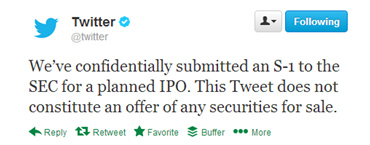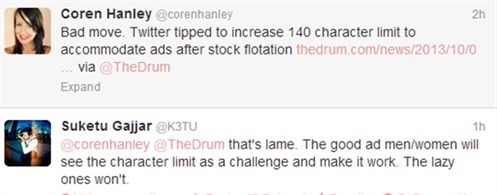Twitter's IPO: a 140 character death sentence
04 October 2013
Twitter’s IPO has taken up most of the social media headlines over the past month. It’s been rumoured throughout 2013 following Facebook’s stock flotation in 2012, but now it’s coming, and is expected around Thanksgiving – hopefully a nice gift for the brains behind Twitter! In true Twitter style the IPO announcement was made with a tweet from Twitter itself:

Ultimately, what the IPO means is that Twitter will need to improve its advertising offering to generate a nice return for investors (no one wants a swarm of unhappy, out-of-pocket investors – just look at Facebook!). Twitter’s current advertising offering is quite different to that of Facebook and LinkedIn. For a start, targeting options are much less specific, meaning ads are less relevant to the users which see them. But they’re also less damaging to the user experience; sitting nicely within the Twitter feed or list of Trending Topics instead of being blown out of proportion and “in-your-face”. This is great from a user perspective, but obviously not ideal for advertisers as they can quite easily be ignored. I myself can’t think of a time when I’ve ever clicked on a Twitter advertisement, unless by accident.
So following flotation something’s gotta give. And it’s been reported that it’ll be Twitter’s famous 140 character limit taking the bullet.
To say I was shocked would be an understatement. How can Twitter kill off its 140 character limit?! It’s part of Twitter’s anatomy; it’s what sets it apart from Facebook and LinkedIn. Wouldn’t a more viable option be to add new targeting options to make ads more relevant? The beauty of tweets being limited to 140 characters is that they’re easy to read at a glance. In an age where people are increasingly busy, always on the move and have much less spare time to absorb content, this has played in Twitter’s advantage, and made it a key news channel. Thinking also about mobile – a platform at the forefront of Twitter’s strategy – you have to question how long advertisements will impact the user experience. Lengthy tweet advertisements exceeding 140 characters could take up a lot more real estate, meaning there’s a lot less room for tweets from a users’ followers to be displayed…the tweets that people actually want to see.
And what about brands? In the past many have complained about the 140 character restriction not enabling them to get their message across effectively, and have received a response along the lines of “deal with it”. But as one Metia colleague pointed out, brands should embrace the 140 character challenge. Marketers should be creative – it should be built into their personality. They should be able to create compelling and impactful advertisements with just 140 characters.

If this news is true, it’ll be interesting to see how it’ll impact user figures and whether it’ll attract more advertisers to Twitter. The brutal murder of the 140 character limit is basically Twitter giving in to the corporate game. No longer will the platform be about its users, but instead it’ll be about investors. About making money.

